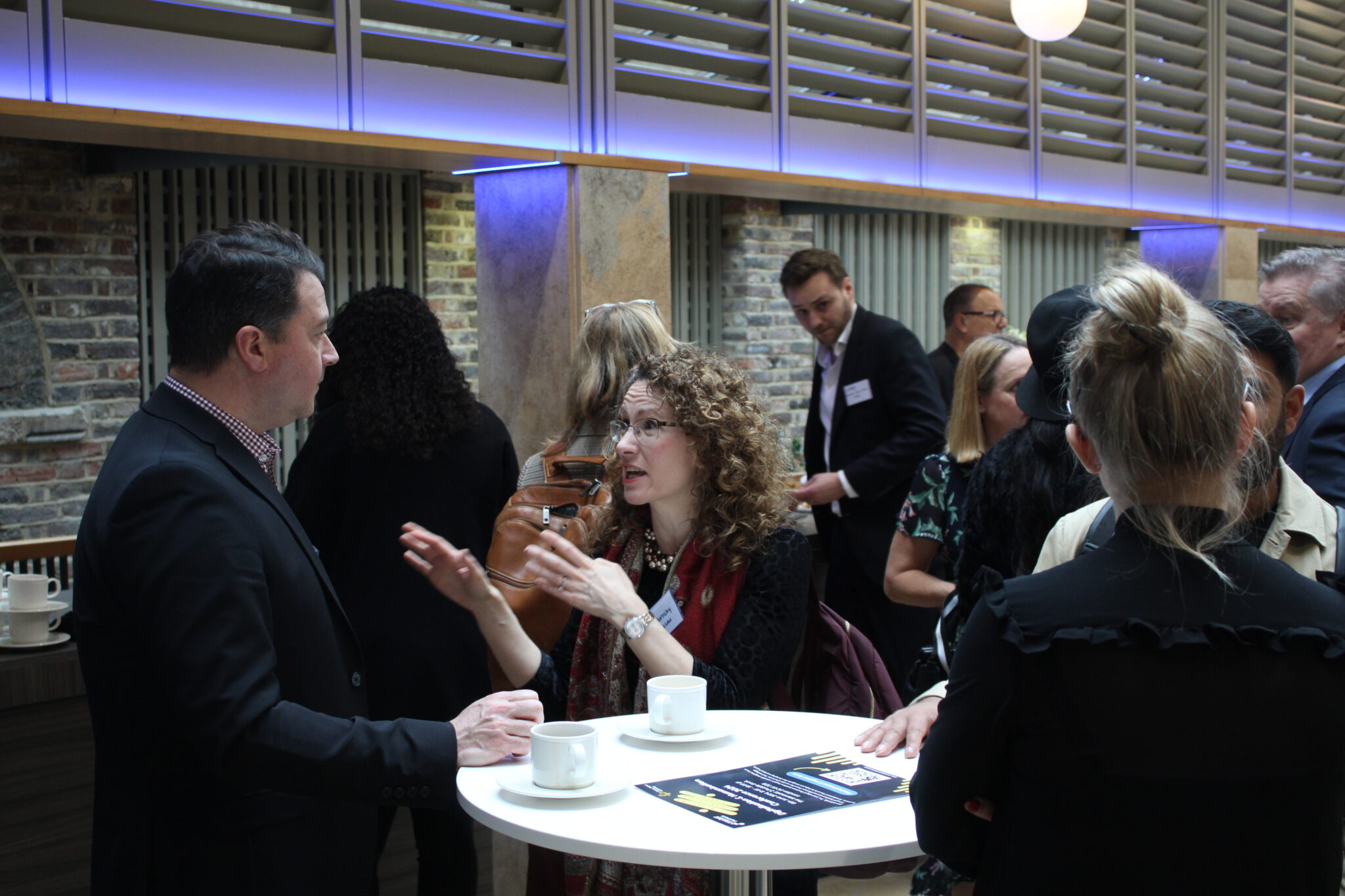On March 13th, our long-awaited TALiNT Partners: Talent Leaders Horizon Summit was held, bringing into sharp focus the talent trends and challenges facing employers in 2024. Target Talent Acquisition (TA) experts gathered at The King’s Fund in London, to hear multi-dimensional views surrounding the evolving recruitment and candidate markets in the shadow of Artificial Intelligence (AI). The event was partnered by Indeed, Unifrog, Giant Group, AMS and Eightfold.
The packed room enjoyed lively discussions with some of the UK’s leading TA technology providers. Engaging panel Q&A sessions and peer discussions led by top thought-leaders in TA across EMEA, alongside solutions experts.
Ken Brotherston, Chief Executive Officer of TALiNT Partners and Declan Slattery, Head of Employer Programme and Chair of Global Advisory Board at TALiNT Partners opened the summit and welcomed attendees by saying Pandora’s box is open, AI can not be ignored, but rather than fearing the ‘Frankentech,’ if used correctly, AI enables the humanisation of TA – allowing streamlining and access to wider talent pools.
Next up was guest speaker Becky Williams, Talent Strategy Advisor from Indeed, who shared her valuable insights on future strategic planning. She understands first-hand the hysteria surrounding AI, workers fearing the “robot army” will steal their jobs. However, she argues Generative AI is already amongst us in everyday use. By investing in employees, she believes organisations mitigate the negative aspects of AI and create a more resilient workforce.
Make sure the right people are in the right place at the right time with the right skills to make sure the strategy of the organisation can be delivered
“Automation can save up to 14 hours a week of recruiter time from manual processes,” AI can help workers focus on meaningful work, improve job satisfaction, and reduce burnout. Tech is enabling workers by building human connections. However, on the flip side, “AI is not perfect, it’s programmed by humans,” and there are real concerns such as; job automation, bias in algorithms and privacy concerns. Employers need to strike a happy balance between using AI responsibly to reduce workloads – without the risk of alienating employees.
After lively round table discussions, Tomorrow’s Talent Today: Innovations and Future Thinking in TA was the next panel discussion with; Todd Harrison, Head of Talent Acquisition and Diversity at Sony Europe, Dan Haslam, Group Sales Director at Giant Group, Caroline Lumley – Enterprise Account Executive Company and Becky Williams from Indeed, they all agreed AI will shape TA by identifying skills and potential, but, human skills are vital and AI should be regarded as a “co-worker” for better outcomes.
In the human- vs.- AI debate, Todd from Sony is, “bringing candidate experiences to life.” When introducing new tech: “Our team is building the human touch into our processes as we introduce new tech. For example, rather than text screening and email, we use camera video screening calls and assessments with shortlisted candidates. We are reintroducing the often forgotten art of cold-calling! So far, the feedback has been positive with candidates thanking the team for having a proper conversation.”
In terms of future-proofing the TA industry, Caroline believes the focus should be: “On the individual, looking at ways to maximise their potential – there may be a person using 60% of their skills and the organisation needs to tap into that.” She urges companies to be more agile, looking towards; upskilling workers and reviewing what skills they have and what they need moving forward.
Becky recognised some TA leaders are excited by “shiny new tech,” but others fear it – she believes AI can help elevate TA teams by giving a platform for businesses to demonstrate how data-driven they are. She also touched on the pros and cons of flexible working, advising employers to have a clear transparent message to enable jobseekers to make informed decisions.
Some TA teams are shifting focus from permanent hiring to contingent hiring, and with that comes challenges around compliance and onboarding. Dan from Giant Group recognises that companies need to value their freelancers, as they are looking for the right brand on their CV and if they have a good experience they will recommend the company to others, “it’s a good circle.” He also pinpointed a shift towards the “platform trend,” by saying: “In Europe, there are 25 million people taking work via platforms – that’s expected to get to 45 million by the end of this decade.”
The panel agreed TA leaders must showcase their data-driven approach to delivering ROI and measuring success while weighing up the human touch and candidate experience and focusing on branding, transparency, diversity, and sustainability.
Guest speaker, Serena Dempsey, Head of Talent Operations, Global Talent at Ipsen, a biopharmaceutical company, was tasked with streamlining the company’s recruitment process and shared insights on Building a Global TA Foundation for the Future. Outcomes included moving to a more global TA structure from a regional approach, harmonising recruitment processes across regions, as well as enhancing existing TA technology, and introducing new AI technology to reduce the TA team’s administrative burden.
AI can allow you to be more human. It can free up time for TA partners to be experts and provide that human touch; cold calling, head-hunting, candidate care, and providing talent intelligence.”
Serena believes in upskilling internal TA teams, “auditing what technology you already have,” and understanding AI is an integral element to TA strategic planning: “AI can allow you to be more human. It can free up time for TA partners to be experts and provide that human touch; cold calling, head-hunting, candidate care, and providing talent intelligence.”
After some insightful roundtable discussions, Debra Sparshott, Head of TALiNT Partners Insight and Research, chaired a Q&A asking: What are the TA priorities in 2024? Panel members included; Edward Abel-Smith, Client Director at AMS, Marcelle Foxcroft, Global Head of TA Trustpilot, Tom Baker, Head of Talent and Resourcing at M&G and Caroline Collins, Head of Employment Partnerships at Unifrog.
Ed started by affirming that TA leaders have a greater voice and driving change, “shaping the conversation and more visible than ever before.” He noted that there are more investment opportunities, but greater pressures on TA to be more efficient.
When it comes to using AI, Tom’s company takes a more reflective approach, adding: “We haven’t yet invested in additional TA AI tools … it’s more important to understand the individuals and skills within your organisation, we appoint about 35-38% of positions internally and overall, 91% without the use of search partners.”
Caroline from Unifrog, whose platform supports 1.7 million 11-18 year-olds discussed the untapped potential that TA leaders could be missing out on. In terms of early talent strategy, she urges hiring managers to expand their engagement age: “We know there is currently a skill shortage that will only widen…What are we doing to address that younger audience? If you are looking at an engineering skill set for example, you need to be reaching out to Year 9 (age 14), as that’s when they are making their GCSE options which will impact their future career choices.”
Marcelle shared her views on the impact TAs have on profit and loss. Her advice is to step away from the transactional stuff and understand how the business makes money: “Make sure the right people are in the right place at the right time with the right skills to make sure the strategy of the organisation can be delivered, ”adding, as a TA leader, you need to put a commercial lens on every conversation and adapt quickly at what the world throws at you. On a practical note, she said it’s: ‘Not the what, it’s the how,’ her strategy is: “Build, Buy, Borrow Bot” and have a good mix of this to future-proof your organisation.
Simon Fanshawe OBE, co-founder of diversitybydesign, consultant, writer and broadcaster, gave a thoughtful insight into D&I. For some organisations, rather than D&I being just a tick-box exercise, the key questions are: “Why are we doing this? How does diversity drive the company’s strategic goals? Adding: “Inclusion comes from understanding differences’‘ and ensuring people can bring their best to work. The danger is that at the moment the way inclusion is practised is the imposition of rules and prohibitions, rather than the valuing of difference. TA managers should hire for differences and then encourage their staff to “talk and learn” rather than “point and punish”. Simon concluded that when looking through a diversity lens companies need to measure outcomes, not inputs, to see what has been achieved. To create true diversity and real inclusion in companies: “We need to see difference, value difference and then combine it.”
After listening to guest speakers, engaging in round table discussions and networking, the summit closed with five inspiring takeaways: “Keep moving forward,” “It’s ok to ask why,” “Everyone wants to get to the next stage, we all share similar challenges” and when it comes to AI…“Absorb it, anticipate the future demand and keep thinking ahead.”










